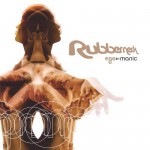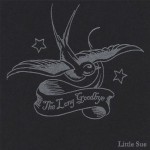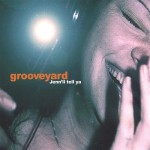 Rubberneck
Rubberneck
Ego><Maniac
Burnside Distribution Corp
It’s been four and a half years since we last had a recorded document from Rubberneck. Headed by the brothers Ojeda- Ricardo on guitars and vocals and Pablo on bass- the band has survived numerous personnel changes, while maintaining a high standard for their Latin/Funk/Soul musical enterprise. This recording lives up to those high standards, as the band continues to forge new stylistic ground, while solidifying the ground already tread. With this incarnation, the band has never sounded better.
Much of this is attributable to guest drummer Bruce Carter; whose work in the ‘80s with the premier Portland Funk band, Cool’r (as well as an earlier stint with Pleasure), ranks as some of the finest drumming ever witnessed in this city. Here, Carter absolutely nails every nuance of every song. The man is a true professional, and a great one at that. His presence, alone, here, fully escalates this project to another level.
The horn section, comprised of sax man John Morrow and trumpeter James “CJ Groove” Gregg, also contributes consistently punchy horn charts (sax solos were contributed by longtime scene veteran Tim Bryson, as well as by Josh Cliburn); executed with expert precision. Also, mention must be made of the truly pristine recording quality provided by Falcon Studios.
The album kicks off with “With Me.” Chicago-meets- Tower of Power horn lines zigzag over Ricardo’s funky wah-wah rhythm guitar. Powerful duet lead vocals add depth and color to the presentation. Lyrically, the topic stays close to the usual Funk fare- an espousal of nonspecific commitments and prowesses directed toward some new acquaintance, with the apparent objective of succeeding in a sexual conquest. “I would do anything/ Say anything/Be anyone, girl/To get you with me.” Well there you are. However the sum effect of the entire enterprise is quite agreeable, especially Pablo Ojeda’s interplay with Carter.
“That’s How It Is” takes a different, more conciliatory tack. Evidently there’s been some heartbreak here, with Ricardo lending the requisite shoulder upon which to cry; a touch of urgency in his vocal approach. Instrumentally, it’s a stripped-down sound, with Ricardo’s mournful wah-wah rhythm guitar tracing four simple chords (C-Em-Bflat-Dm) over Pablo’s active bass and Carter’s impeccable drumwork. Here the horns perform a standard chord-pad function: one that departed keyboardist Joey Porter would have taken better advantage of in the past.
A hint of Mexicali horns flavors “Forever,” a tune that might float out into Santana-like territory, with Ricardo’s vocals recalling those of Greg Rolle for Santana in his pre-Journey days of the early ‘70s. “I Don’t Know” seems to recapitulate themes explored and expressed in the first number. Ricardo varies his vocal delivery on “Creep,” as he switches between a slippery Curtis Mayfield-like falsetto and a more straight-ahead approach. “E-A-B” is titled after its signature chord progression, more a less a sort of jam tune.
“I Like The Way” is an uptempo Funk romp, with gang vocals that call to mind some of War’s songs of the early ‘70s. Here again, the lyrical sentiment echoes those of “With Me,” full of the sort of male bravado which appears necessary to properly function in today’s high-pressure dance club society. “The Same” moves seductively across a very satisfying Em-Am-C-B7 chord progression on rhythm guitar. Vocally, it sounds as if Ricardo is taking a stab at the sort of finesse vocal Rob Thomas did with Santana on “Smooth.” An impassioned whisper. This song is reminiscent too of the work of Nuclear Valdez- a Latino rock band from Miami that achieved some MTV airplay in the early ‘90s. Very nice.
The horn lines to “Right Back” seem nearly lifted, intact, from Phil Collins’ ‘80s hit “I Missed Again,” which is an interesting concept: rather than sampling a part, the band simply plays it instead. The song breaks into a sexy groove that seems similar to Terence Trent Darby’s ‘80s hit “Wishing Well,” only speeded up somewhat. Probably the strongest chorus of the lot makes this the most memorable song of the eleven presented on the album. Also, Ricardo steps out for a rare guitar solo, making this cut even more unusual.
“Either Way” seems to derive its vocal melody from Thomas Dolby’s “Hyperactive,” while adding Latin rhythms and dithering Funk horns. Bryson and Gregg cut loose with tasty solos in the middle. Another keeper. A further example of a smooth, Latin/Soul sound, “Desire” smolders with sensual fire.
Great arrangements and tremendous execution help to mask the fact that the material isn’t particularly great here. With a couple of exceptions, “Right Back” the most notable among them, the songs lack the sort of hooks necessary to carry the day in the big leagues of the music industry. The musicianship, especially that of Bruce Carter is exemplary, with the other players rising to the high standards Bruce creates.
This is a good album from Rubberneck, but it fails to give the band a distinct personality. Ricardo Ojeda does his best to vary his delivery, trying every trick in the book to give his vocals textural diversity. But, despite all his efforts, his vocals fail too to establish a fulfilling emotional identity. Likewise the materials itself, while always above average, unfortunately never really launches itself into the next stratum. Sonically tremendous. Impeccably played. This is a fine effort from one of the city’s longest running club acts. Will this album achieve for them the national exposure they have sought for so long? It’s hard to say. The jury remains out on that one.
 Little Sue
Little Sue
The Long Goodbye
Self- Produced
It’s been nearly four years since we last had an album from Susannah “Little Sue” Weaver. Sue has developed a staunch following in the local Folk scene, after serving a lengthy tenure with the Crackpots in the early ‘90s. Over the succeeding years, she has honed her craft as a solo Folk singer, creating a body of work that speaks to matters of the heart and the human condition.
While some may think this to be a chronicle of the local club that is now called Jimmy Mak’s and others might deduce from the title of this outing that it is perhaps some paean to mystery writer Raymond Chandler, it is in actuality, an extended ode to the end of a long-term relationship. It is unclear whether it is a past or present relationship; or whether she is dissecting a close, interpersonal relationship, a parent/child relationship or something else.
Whatever the case, Weaver touches on subjects such as anomie, desolation and loneliness, relationships, love and loss, remorse and regret, with touching poignancy, offering brief glimpses into the darkened cave of her psyche. And beneath it all is a hard-won wisdom in which she sees her world with utter and complete clarity, without facade or illusion. It’s a harrowing vision, yet starkly beautiful as well.
Produced by Ezra Holbrook (who must live in a world of 48 hour days. There is no other way to explain his peripateticity. The man is everywhere, all the time, as if working in some hyper-dimension outside the ken of mortal men), the accompaniment here is sparse at times, with an array of instrumentation, including brass and strings, flute mandolin, various keyboards and guitars; all of which add color and contrast to Sue’s stark revelations.
The album begins with “Country Song,” a quiet elegy that highlights the supple twang in Sue’s voice, not unlike that of Nanci Griffiths. A faint, haunted keyboard string/flute pad closely follows Sue’s solitary acoustic guitar, the only instruments on this sad little tune. A sauntering gait, accented by Chris Hutton’s restrained drums and Bill Rudolph’s dancing basslines, are supplemented by watery flutes and some kind of whirring gizmo in the mix of “I Can Wait.” Beautiful three-part vocal harmonies reminiscent of those of the sirens in Oh Brother, Where Art Thou decorate the chorus.
Changing gears, shifting into overdrive, “Scary Places” plays hard upon a bed of gritty electric guitars and chiming piano figures, over which Sue coos like Karen Peris of Innocence Mission, a lyric about disappointment and lack of resolve in the face of a deteriorating relationship. In some ways it sounds like a female version of early Neil Young, circa “The Loner.” The title track is similar in structure and instrumentation to “Country Song,” another simple Folk tune. The final verse quickly sums up the message of the tale. “Half past two has come and gone/It’s just another song/Another half-baked reply/To something that you never really said/Something I misread/But, hey, I know we really tried/That’s the hardest part of the long goodbye.”
Paul Brainard’s pedal steel guitar dawns on “Blinded” like a saddled-up sunrise harkening orange and purple on a morning horizon, as the dusty trail of Sue’s vocals winds across a lonesome prairie of a song. A real string section marches behind Sue’s wayfaring vocals on “Somehow,” as the lyrics create an aura of suffocating stasis: a relationship stuffed into a small, airtight stranglebox- with no hope, no future.
Capo-ed to the 4th fret, Sue Cotten-picks a delicate C-position melody in E major on the piquant little gem “Years.” Delicate vocal harmonies shadow the turns in this mere slip of a song. A hint of Mick Chegwidden’s mandolin flutters briefly in the middle interlude. Pretty. Pedal steel guitar tumbleweeds, bounce in the mandolin wind of “Dysfunctional Love Song.” As Marilee Hord’s forlorn violin wails in the distance, Sue waltzes in the dust with her acoustic guitar.
“Gone” is a ghostly number, which Sue co-wrote with Nancy Hess- almost in Aimee Mann territory, but twang-ier. Jen Conlee’s Wurlitzer interjections play against electric guitar phrases in the memorable chorus. A good song. A piece of the lyric recalls the naiveté of Neil Young’s “Sugar Mountain.” “It happened so fast… put you in the past and in this song/I rolled down the stairs with you unawares that we were done.” Eeek!
Brainard’s choral brass embellishments lend “Change Your Mind” a -Beatles-like quality, as do the “oohs” and “ahhs” of the harmony vocals. “Tenderfoot” ambles slowly, drums and electric guitar punctuating the funereal atmosphere. Ethereal keyboard sounds hover in the far background, as disembodied backwards flutes provide the accents at the turns. Angular piano arpeggios tinkle down like empty wine bottles falling on a hard floor. Sue’s voice creaks like an old rocking chair straining beneath an enormous weight. “We had a Cadillac… traded in for a car/Stuck in a black hole, where there once was a star.”
The final track is the “truckin’” little number “Wing Nut,” familiar in a way similar to Juice Newton’s “Queen Of Hearts,” with Brainard’s slide guitar and smart, low-string electric guitar solo defining clearly the parameters of the song. The light-hearted nature of this number seems a bit out of place with the rather bleak world view put forth in the dozen songs to precede it, but, there you are. Were it not for the incongruities of human nature, what would there be?
Sue Weaver delivers a gloomy portrait of human desolation in the land of interpersonal relationships. The production on the album never overwhelms her fragile voice, but serves to flesh out the musical character in her songs. The songs themselves are brief glimpses into the processes of grief and catharsis, which all humans experience at one time or another. And here we have a sad, sad scrapbook of her own dark and deep despair.
 Grooveyard
Grooveyard
Jenn’ll Tell Ya
A7D Productions
It took me quite a while before I got the pun that is the title of this album. But, the truth is, Grooveyard lead singer Jenn Dashney sings, balls out, all the time. “Jenn’ll Tell Ya” ? Genitalia? Get it? Oh come on!
Jenn and her five compatriots play tight, Jazz informed Funk, maybe like an updated version of Flora Purim and her work with Return To Forever in the ‘70s. The band: drummer Dave Muldoon and bassist Dallas Huber, guitarist AG Donnaloia, reed man Mike Wayland, Russell Scott on the brass, along with occasional contributions from flautist Nate G, are top-flight musicians, who carve their way through some fairly rugged material like a hot knife through butter.
As mentioned earlier, Jenn Dashney has vocal chops galore. Check out the first track, “So Serious.” She’s all over it. Sledgehammer vocal ululations abound, mellifluous mellisma flowing like wine. Thick slick horn charts ribbon like a bright snake, slithering in the sun. Hot shit. “Wicked World Spin” sounds like a reworking of Edie Brickell and the New Bohemians’ “What I Am,” with the Jazz allusions of the original version here fleshed out by people who really know how to play such material. Plus, Edie Brickell couldn’t shine Jenn’s shoes.
A nice interplay between Donnaloia’s plaintive guitar and Wayland’s dusky sax, along with Scott’s buffeting harmony trumpet licks, kicks off the moody ballad “Pitiful State.” A sort of reworking of Henry Mancini’s “Charade” or Leon Russell’s “Masquerade” (a similar song) Dashney vocally caresses the song in a way Nelly Furtado might, occasionally bursting forth with volcanic intensity.
Nate G’s fluttery flute intermixes with Wayland’s rumbling baritone sax, creating Be-bop textures on “This Time.” Dashney sprints across the musical terrain as if barefoot on hot sand. Donnaloia’s Spanish guitar stylings add distinctive flavor to “Blues For David.” Jenn smolders like a pot full of hot chili, her vocals effortlessly slipping and sliding around in the mix. “A Little Less” utilizes more subtle Latin phrases, with Jenn dishing out scat vocals that would be the envy of Ricki Lee Jones: like an Ella Fitzgerald for the Funk generation. “Sonrisra de Ahya” maintains a sunnier Latin feel as well.
Donnaloia demonstrates some fine Jim Hall-like chops on jazz guitar with “What’s My Motivation.” Dashney too, displays further evidence of a virtuosic vocal instrument swooping and diving like a diva on a roller coaster. Flute and brass mingle with dynamic guitar passages on “Stop At Nothing.” A faint Reggae undertone plays through the verses as Jenn works the vocals like Mariah Carey on anabolic steroids. Guest vocalist Mic Crenshaw throws an intelligent rap in the middle, followed by some zesty sax licks by Wayland. Moreso than on most songs, Dashney shows a trace of restraint in her unrelenting display of vocal gymnastics.
If there is one complaint about this stalwart crew, it’s that they are unyielding in the display of their virtuosity. Dashney, especially, foregoes emotional connection to the material in an inexorable exhibit of her obvious chops. Nuance and shades of subtlety are mostly laid by the wayside. The material, while obviously technically superior in the areas of arrangement and execution, is melodically bland, leaving Dashney to hyperventilate remorselessly through most of the songs. This is a waste of a great voice.
She has taken all the vocal lessons she’ll ever require, now Jenn Dashney needs to learn how to really sing. As with all great musicians, she must learn that it is not how many notes that are played, but the silences in between. She must learn to balance technique with restraint. As it stands we are relegated to listening to endless displays of her awesome vocal prowess, which is impressive, to be sure, but emotionally unsatisfying and ultimately disappointing.
I would like to hear this band find more melodic songs for Dashney to sing. There is no doubt that the players would create rich, potent arrangements for such songs. Also, one would hope that Dashney would learn to curtail her ceaseless vocal noodling and learn to focus on the subtleties in a good song, while exploring the myriad possibilities offered by a modicum of restraint in her presentation. This is a very talented band with a lot of possibilities. Whether they choose to realize these possibilities is a conclusion that is theirs alone to reach.
